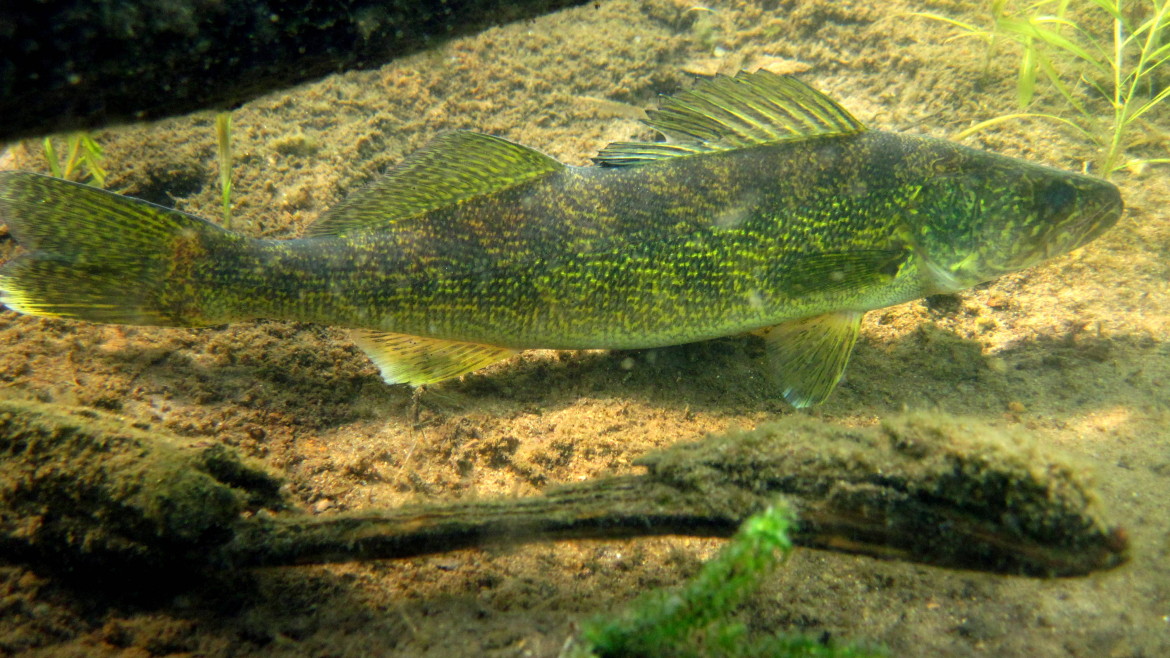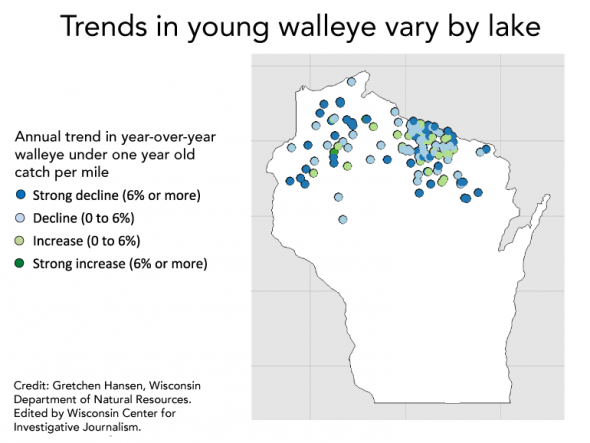Cuts In DNR Scientists Could Hurt Walleye Fishing
Longterm DNR efforts to reverse Walleye decline in state lakes could be hurt by Walker's proposed cuts.

Wisconsin walleye have been declining for a long time. They aren’t as plentiful as they used to be, and they’re growing more slowly. Many lakes that used to support natural walleye reproduction no longer do, according to Gretchen Hansen of the Wisconsin Department of Natural Resources. Photo by Gretchen Hansen of the Wisconsin Department of Natural Resources.
Fond du Lac resident Mike Arrowood says he has begun to see fishermen from up north migrating south to find walleye.
“The guys at Manitowish Waters, they come down to Lake Winnebago to fish. Why should they fish in northern Wisconsin?” said Arrowood, chairman of the nonprofit group Walleyes For Tomorrow. “You can’t catch any fish.”
Wisconsin’s walleye have been in decline for as long as scientists have been collecting solid data, about a quarter-century, and it is Gretchen Hansen’s job to unravel why.
“I can tell you I have not yet figured it out,” Hansen said in a December interview.
Now the state Department of Natural Resources’ ability to research and reverse that decline could be at risk. Gov. Scott Walker has proposed cutting 18.4 research science positions in the agency’s Bureau of Science Services, potentially including Hansen and several others who study the state’s most popular sport fish.
At the same time, the governor has proposed spending $2.6 million to continue stocking Wisconsin lakes with walleye over the next two years, part of the $10 million Wisconsin Walleye Initiative — a short-term boost to the population that researchers say is unlikely to solve the underlying problems with the species.
Ultimately, “the most cost-effective way” to solve the problem is to “have healthy, self-supporting systems,” Vander Zanden said.
Arrowood called the stocking plan “a waste of money” considering “how few survive.”
George Meyer, a former DNR secretary under Republican Gov. Tommy Thompson who now heads the nonprofit Wisconsin Wildlife Federation, said the cuts would cause “a very dramatic reduction in data for managing fish and wildlife in Wisconsin.” His organization, along with other hunting and fishing groups, sent a letter to legislators criticizing the plan.
Asked what effect the cuts might have on walleye research, DNR spokesman Bill Cosh said the department considers walleye and other fish and game research to be “priorities for the agency and our customers,” and said the department “will work with the positions that we have available and prioritize our work.”
Helen Sarakinos, policy and advocacy director of the nonprofit River Alliance of Wisconsin, said the DNR did not appear to be fighting the cuts. The river and watershed advocacy group stands to lose $138,400 in funding under the proposed budget.
“It makes no sense at all that we gut all the planning and research that goes into protecting and stewarding these resources,” she said. “We have to ask: Why are they doing this?”
State lawmakers on the budget-writing Joint Finance Committee may take up the DNR cuts on Friday. Three Republican members and one Democratic member of the JFC did not return inquiries.
Economic stakes are high. Sport fishing is worth about $2.75 billion in Wisconsin, according to the governor’s administration.
The governor has proposed to cut 66 positions from the DNR altogether. In addition, state law requires an agency to terminate all limited-term employees, or LTEs, before it can lay off a single permanent staffer.
A DNR organizational chart from late 2014 listed 12 LTE scientists in the fisheries and aquatic sciences section.
Walleye babies in trouble
In Green Bay, walleye are “a world class walleye fishery,” according to Titus Seilheimer, a fisheries specialist with the UW Sea Grant Institute. It supports big fish, and lots of them.But the state’s inland lakes are another story.Researchers have found that in many lakes, walleye are failing to regenerate their numbers — scientists call it a “recruitment failure.” Lakes that used to support natural reproduction no longer do.
The density of the youngest walleye, those under a year old, is down 6 percent a year overall in the northern lakes where most of the data are collected, according to the DNR’s Hansen.
“That is what is the most scary,” Vander Zanden said. “There’s something about the environment that is just not right for the babies to survive.”
There are also fewer walleye out there. Together, the “productive capacity” of Wisconsin’s lakes is down — like a garden that is less fertile than it used to be.
Clues emerge
There are numerous potential environmental causes, like predation, food, habitat or invasive species, Vander Zanden said.
So far, the researchers have have found some simple variables that predict walleye success, Hansen said.
That is an important step toward figuring out which lakes are likely to support walleye, which will help managers decide where to focus stocking or habitat restoration efforts.
Lake size is one top determinant; another is the overall temperature. Basically, walleye seem to do well in big lakes with cooler water. How squiggly the lake shoreline is seems to matter as well. They like darker water, but many lakes have cleared up.
The Wisconsin researchers have received recent recognition from fellow scientists for their efforts to tease out what is happening. A paper sent to the Canadian Journal of Fisheries and Aquatic Sciences was deemed the “editor’s choice” in March, according to a DNR newsletter.
The editors cited “the impressive spatial and temporal scale” of the investigation and “the importance of (the) findings for management of walleye both in the U.S. and here in Canada.”
Some of the theories researchers are examining:
All about that bass?
Bass are up and walleye are down, and a popular theory among fishermen is that bass eat baby walleye. Arrowood, for one, believes it is a strong possibility.
But researchers from UW-Stevens Point pumped a bunch of bass bellies and found no walleye. And the inverse correlation could be explained in part by the fact that bass are mostly fished catch and release, while people fish walleye to eat them — or that both fish are responding to other environmental factors. Meanwhile, muskies are eating walleye in some lakes, but it is unknown how important that is.
Climate change. There is no obvious correlation. Climate change has affected all the lakes, but walleye have declined only in some of them. Researchers nonetheless believe it may be affecting the fish, in part because walleye tend to do better in cooler water.
Vander Zanden calls the problem “very multidimensional” — meaning a dizzying array of factors could be at work, and they affect each other.
Warmer temperatures could affect water clarity, lake levels, the layers of temperature in the lake, just to name a few variables, all of which could affect walleye. And bass do better in a warmer world, so if they are directly competing with walleye, more bass would be bad news for walleye.
Overharvesting. Since the heated arguments over tribal walleye spearing in the 1980s, walleye regulation has been overseen by the courts, which affirmed the tribes’ right to spear fish. A legal agreement intended to keep the population sustainable declares no more than 35 percent of the adults can be removed each year.
Vander Zanden says some research suggests the one-size-fits-all limit may be way too high for some lakes.
“It is leaving them open to overexploitation,” he said — that is, removing more adults from the population than it can regrow.
He likened it to pulling out more money from a bank account than its interest rate can maintain, and therefore decreasing the principal. That may be causing some of the decline.
“Understanding is the basis for addressing the problem,” Vander Zanden said. Scientists are beginning to mobilize against Walker’s plan. A group of five prominent researchers will hold a 2 p.m. news conference today at the Capitol, Room 330 Southwest, to discuss the cuts to the science bureau.
This story is part of Water Watch Wisconsin, a project examining water quality and supply issues.The nonprofit Wisconsin Center for Investigative Journalism (www.WisconsinWatch.org) collaborates with Wisconsin Public Radio, Wisconsin Public Television, other news media and the UW-Madison School of Journalism and Mass Communication. All works created, published, posted or disseminated by the Center do not necessarily reflect the views or opinions of UW-Madison or any of its affiliates.
-
Legislators Agree on Postpartum Medicaid Expansion
 Jan 22nd, 2025 by Hallie Claflin
Jan 22nd, 2025 by Hallie Claflin
-
Inferior Care Feared As Counties Privatize Nursing Homes
 Dec 15th, 2024 by Addie Costello
Dec 15th, 2024 by Addie Costello
-
Wisconsin Lacks Clear System for Tracking Police Caught Lying
 May 9th, 2024 by Jacob Resneck
May 9th, 2024 by Jacob Resneck






















